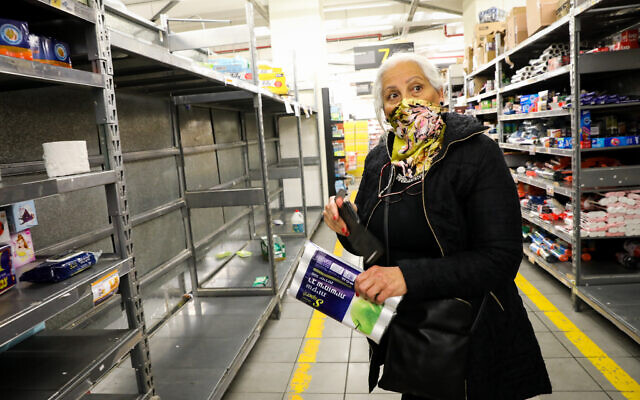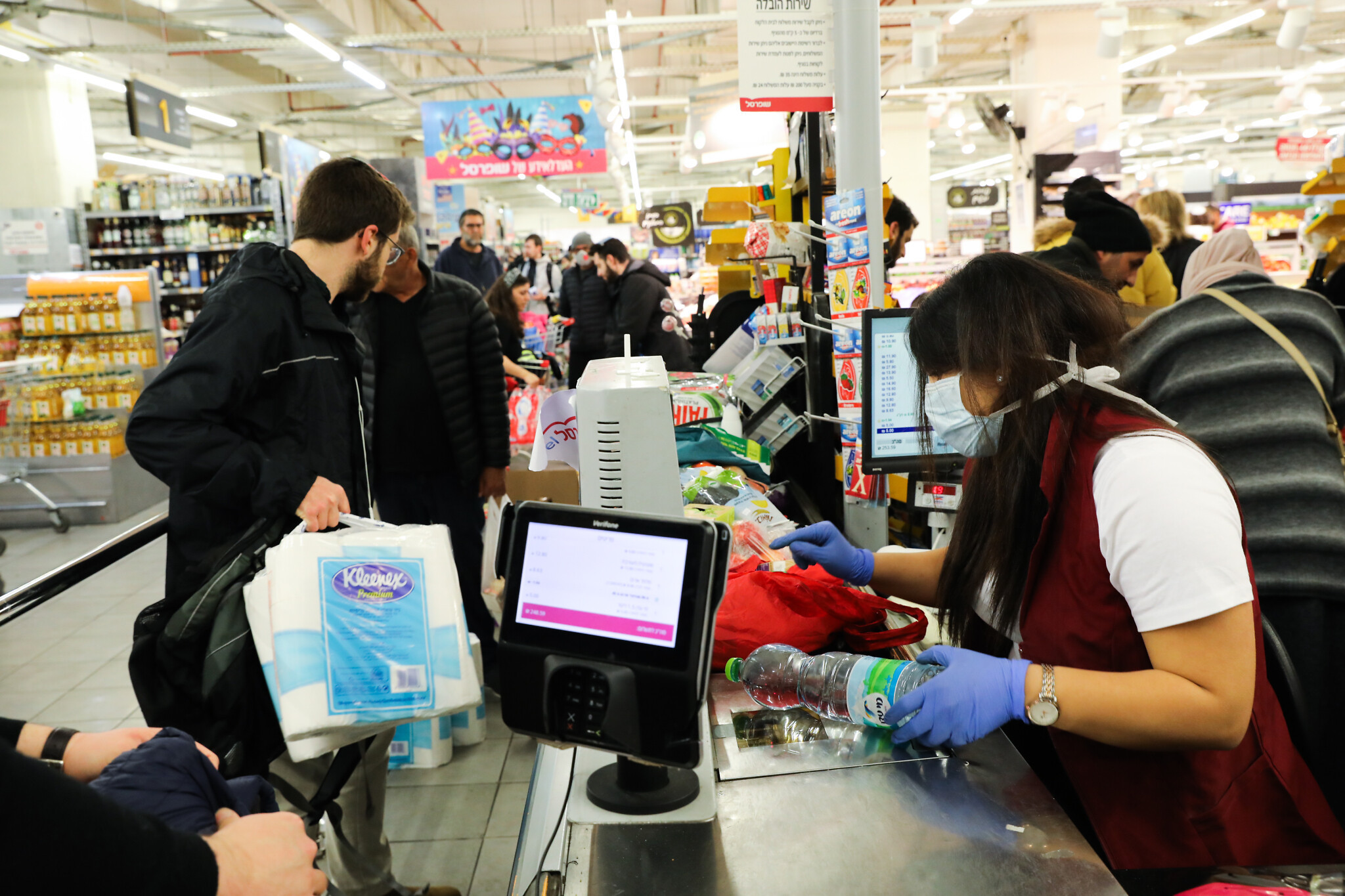Following up on Netanyahu’s announcement, Health Ministry lays out long list of businesses, services and activities that Israelis will now have to do without

The Health Ministry send out a message overnight Saturday clarifying a raft of new regulations announced hours earlier by Prime Minister Benjamin Netanyahu to combat the spread of the coronavirus, including banning gatherings of more than ten people.
The message emphasized that all educational institutions would be shut down starting Sunday, regardless of the number of children per classroom, among them daycare centers — including home daycares — special education, youth movements and after-school programs.
It also said that, save for supermarkets and pharmacies, all malls would be closed. Restaurants and hotel dining rooms will also be shuttered — aside from those that provide takeout — along with bars, pubs and dance clubs.
The Health Ministry said gyms, pools, water and amusement parks, zoos and petting zoos, bathhouses and ritual baths for men, beauty and massage salons, event and conference venues, public boats and cable cars, and heritage sites would have to close as well.
It highlighted that the ban against congregating in groups larger than 10 extended to gatherings for religious activities — the minimum number of men for an Orthodox prayer quorum, or “minyan,” is 10 — and mandated that people participating in such activities maintain a distance of at least two meters from one another.
The directives also included a limit on visiting nursing homes for more than one person at a time — and preferably limited to a regular caregiver.
It said that, “for now,” people will still be allowed to go to work — though workplaces were encouraged to continue to prepare to facilitate work from home — but must maintain a distance of two meters from one another.
The Health Ministry also said Israelis should refrain from traveling in a car in groups larger than two and recommended that people refrain as much as possible from using public transportation.
The Jerusalem municipality said in a Hebrew statement Saturday night that it would adhere to the new regulations, noting that public libraries would remain open for lending only, while limiting the number of people allowed to enter to ten at a time. It confirmed that all restaurants and entertainment venues would be closed, save for kitchens that offered takeout services, which would be limited to ten workers. It also said its own workers would begin to work from home, other than filed workers who will continue as usual.

The city of Tel Aviv put out a similar statement confirming that all public activities would be shut down, including in gyms, community centers and on the beaches, where there would be no lifeguard services. It added, however, that municipal workers would continue to provide sanitation and security services, while limiting enforcement of bylaws to severe cases.
Earlier, Prime Minister Benjamin Netanyahu and government officials announced the shutdown of all leisure businesses and activities throughout the country, with the premier pressing upon the public the need to “adopt a new way of life” for the coming weeks and possibly months as the country deals with the new coronavirus — and particularly underlining a guiding principle of individuals maintaining a distance of at least two meters from others at all times.
Sunday morning will see public life further diminished, with the closure of all cafes, restaurants, hotels, malls, movie theaters, gyms, event halls and the like. It was implied, though not specifically stated, that all nonessential shops would close. But Netanyahu stressed that supermarkets, pharmacies, banks and other essential service providers would continue to function.
“This is a battle for public health,” Netanyahu said at a press conference from the Prime Minister’s Office in Jerusalem. “We are at war with an invisible enemy…We are adjusting as things develop. The situation is dynamic.” But, he said, “we can beat it.”
Comparing the situation several times to a state of war, the premier said it was imperative for Israelis to change gears and “adopt a new way of life” for the near future, noting that many Israelis appeared not to be heeding officials’ calls to avoid physical contact and displays of affection, but stressing that this was crucial for the nation to curb the spread of COVID-19.
The two most important issues, he said, were “personal hygiene” and keeping distance from each other. “A distance of two meters. This will protect us. It is very hard [but] it will help us stop infection.”
He stressed that authorities “will continue to ensure crucial services to the market. First and foremost on food — because there was a rush on supermarkets. We have more than enough stocks…including for Passover. There is no justification for [panic].”
Over the weekend Israelis flooded supermarkets to stock up amid fears the country could enter a lockdown and goods could run out — though officials repeatedly assured the public that there was no such danger.

Notably — raising major privacy concerns and prompting accusations of mass surveillance — Netanyahu also said the government would move to use invasive digital monitoring measures to track the movements of sick individuals, which had previously been employed against terrorism.
The number of Israelis diagnosed with coronavirus rose to 195 Saturday evening. The Health Ministry said two of the sick remained in serious condition, with 11 in moderate condition and the rest suffering a light illness only. Meanwhile, nearly 40,000 Israelis were in home quarantines for fear of exposure to the virus, including nearly 1,000 doctors, more than 600 nurses, 170 paramedics, and 80 pharmacists, according to Health Ministry figures. Health officials have conducted over 6,800 coronavirus tests nationwide so far, according to the ministry.
To curb the spread of the virus in the country, all Israelis returning from overseas are required to quarantine at home for 14 days. Non-Israeli nationals were barred from entering the country as of March 12, unless they can demonstrate an ability to self-quarantine for two weeks.
The number of coronavirus cases worldwide passed 150,000 on Saturday, with 5,764 deaths, driven by a spike in infections in Italy, according to an AFP tally compiled from official sources.
As reported by The Times of Israel
